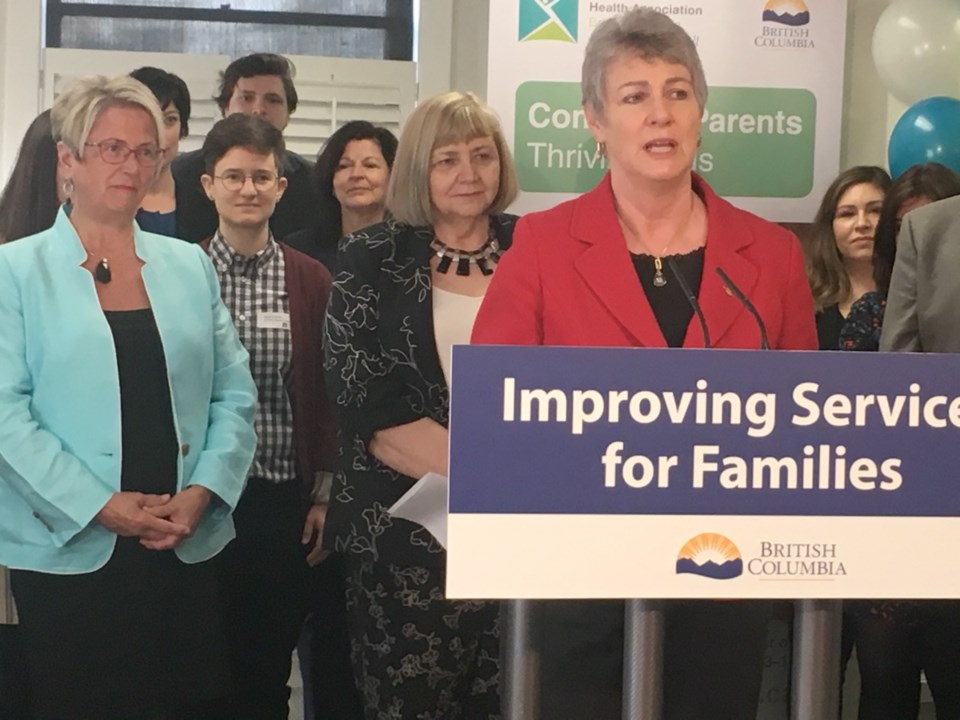Secondary school teacher E.J. Samson and his wife Tiffany, a social worker, are receiving love letters from their nine-year-old daughter. They used to receive hate mail.
They credit a free family counselling course, Confident Parents: Thriving Kids, for that turnaround. They were in Victoria on Friday to tell their story as the province announced a similar program for parents of children with anxiety, for ages three to 12, will start April 29.
Despite the Samsons’ combined experience in child and youth counselling, their daughter’s tantrums escalated into refusals to eat, leaving them feeling ill-equipped as parents.
“We were both struggling. He came from his life experience. I came from mine. We were not agreeing on how to deal with it,” said Tiffany.
Under the free referral-based online and telephone counselling program, which can run six to 14 weeks, Tiffany and E.J. received help from mental-health coaches.
The program has served more than 3,200 families.
The Samsons were advised to start with an immediate reward system focused on their daughter’s positive behaviours.
The turnaround was quick and progressed from there with additional strategies. Almost four months later, the couple applied their strategies as a team and it became “second nature.” They said they felt more confident as parents.
“It really did help,” said Tiffany. “She’s much happier; instead of hate notes we get love notes,” she said of their daughter.
The NDP government with the Canadian Mental Health Association announced Friday they are expanding their behaviours program to help parents and caregivers in dealing with children experiencing mild to moderate anxiety.
“Anxiety problems are the most common problems,” said Charlotte Waddell, director of Simon Fraser University’s Children’s Health Policy Centre. “We estimate about 25,000 children have anxiety disorders at any given time. So the potential is here to help thousands of children. So this is exactly the kind of intervention that we need,” Waddell said.
“We know 70 per cent of serious mental health problems start before the age of 25,” said Minister of Mental Health and Addictions Judy Darcy.
An office at 612 View St. will house as many as 20 coaches — 14 coaches have been hired and are completing orientation and training — to start service April 29. Once up and running, the anxiety program is expected to serve 2,400 families each year.
Anxiety manifest as apprehensiveness, fear, physical symptoms, and avoidance behaviour that impairs normal functioning.
To meet the needs of Indigenous families, CMHA is working with Indigenous Peoples and organizations to develop a culturally sensitive and appropriate model, which is expected to launch in the fall.
Victoria’s Kate Longpre, 39, a single mother to two girls age 13 and 9, said the behaviours program gave her the skills to turn around her then eight-year-old daughter’s behaviour. “I saw a child who was able to let her real personality shine through, who was not as challenged by worries and fears.”
In retrospect, had the anxiety program existed two years ago, it probably would have been a better fit, said Longpre, in praising the program. Having first tried other programs, “the CMHA is the best I’ve ever done.”
As a single working mother, the fact the program is flexible, free and solutions-oriented made enrolment in it practical, she said.
B.C. Minister of Children and Family Development Katrine Conroy said the government is providing annual funding for the program rather than the uncertain year-to-year funding it had before.
It is available evenings and weekends.
Access requires a referral from a physician or Ministry of Children and Family Development community child and youth mental-health teams.
The province says the $5.75-million investment for the anxiety program, including $2.75 million for the behaviour program, is part of a five-year, $656-million B.C.-Canada bilateral agreement announced in September 2018, which includes incremental investments to expand home and community care, and mental-health and addiction services.
- - -
• Watch a video about the Confident Parents: Thriving Kids programs
• Get information about Confident Parents: Thriving Kids



